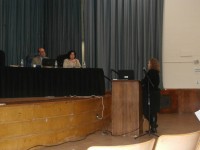Controversial Algonquin Pipeline Project Addressed in Mahopac
 During the last year, a group opposing the extension of the Algonquin Pipeline has gone before different levels of government in hopes of drumming up support to stall the impending project.
During the last year, a group opposing the extension of the Algonquin Pipeline has gone before different levels of government in hopes of drumming up support to stall the impending project.
Last week, SAPE (Stop the Algonquin Pipeline Extension) presented in front of the Mahopac Board of Education at its monthly meeting to speak about the alleged dangers and health concerns of the pipeline extension and how it could relate to the Mahopac school community.
One of the members of SAPE, Courtney Williams, who presented to the board, said after the meeting Mahopac residents could be directly—and adversely affected by construction of a new pipeline. Spectra Energy, which is the company pushing for the extension, plans to build a pigging station in the community, Williams said. The station would result in further removal of “radioactive, hazardous material that built up within the pipeline.”
If the pipeline is put in the ground, Williams added, the community may be faced with hazardous emissions during its normal operation and are at grave risk if the pipeline were to rupture.
Besides the perceived health risks, Williams said construction of the project would result in increased traffic for students trying to get back and forth from school. During the meeting, Williams also stressed the pipeline would not even provide any natural energy to residents of Mahopac or Putnam County, but instead the New England region.
Whether the project goes forward would ultimately be decided by FERC (Federal Energy Regulation Commission), but Williams hopes the Mahopac school board is a collective voice that opposes the project.
“The school board can help by making people aware of the project and also if they speak out against it, to urge our elected officials at various levels to come out against it,” Williams, a Peekskill resident, said.
One of the founders of SAPE, Jerry Ravnitzky, who was in attendance at the meeting and spoke for a few minutes about his concerns, expressed more optimism that the Mahopac school board would take action, as opposed to the Carmel town board that hasn’t shown much interest in the possible pipeline extension, according to Ravnitzky.
Ravnitzky said the Carmel town board has yet to allow SAPE to give a presentation headed by several experts during a meeting. Though SAPE has approached them, the town board wanted to know exactly what the organization would be discussing before they appeared at a future meeting.
“Carmel is the only town that we have approached that has acted in this way,” Ravnitzky said. “Every other town allowed a presentation.”

